METRO SHANGHAI / CITY PANORAMA
UN initiative encourages worldwide awareness and action against plastic pollution
World Environment
June 5 is World Environment Day, an important UN initiative encouraging worldwide awareness and action in environmental protection. Started in 1974, it appeals to every nation big and small to care more about emerging environment issues including overpopulation, climate change, groundwater protection, desertification and marine pollution. World Environment Day is organized annually with one particular theme that focuses on a pressing issue. This year, the theme is Beat Plastic Pollution.
Beat plastic pollution
The Global Times recently hit the streets of Shanghai to ask foreigners to share their opinions on disposable plastic products and environmental protection.
Plastic is of course a part of our daily life, especially plastic tableware, shopping bags and cellophane wrappers around food. Most of our interviewees said that they use and consume disposable plastics quite often, whether they like it or not.
"Coffee cups with a plastic coffee lid almost every day," Monica from Spain told the Global Times. "But I am trying not to use too much plastic in daily life."
"I think I use it more than I would like to," said Carly Freeman from Vermont in the US, adding that she used to see somebody who spent full days or weeks without using any trash or plastic.
"But personally I realize how difficult it is because the world is using plastics to do everything, from cars to water bottles. The world kind of makes it impossible not to use disposable plastics," she said.
Alberto Galan from Spain sticks to his personal "not-use-plastic-product" principle. "I don't use disposable plastics very often and I don't usually buy plastic things," he said. "I don't like plastic."
"But sometimes Galan must go against his own principles, for instance when shopping in grocery stores. "They give me a lot of plastic bags, every vegetable I buy, they give me a bag. But usually I try to put them all together in a single bag," he added.
Solution to pollution
As environmental issues grow more pressing every day, many countries have been working urgently on a solution to plastics pollution. Bangladesh started banning plastic bags in 2002, which makes it the first country to do so, ifeng.com reported in June 2018.
Since 2008, China also started to prohibit producing and selling plastic bags thinner than 0.025 millimeters; local retail markets are no longer allowed to offer free plastic bags. Chinese authorities estimated that 270,000 tons of plastic consumption was reduced within the first year, jiemian.com reported in May 2018.
According to recent information on the official website of China's Ministry of Commerce, the European Commission proposed on May 28 to ban single-use plastic products including cotton buds and plastic straws. They also propose putting a bigger waste-cleaning burden on manufacturers so as to reduce trash in the ocean. The proposal requires European countries to collect 90 percent of single-use plastic drinking bottles by 2025.
Our interviewees shared their opinions on such prohibitions and practices in their home cities. "I think it's a good thing. My school proposed the idea of getting rid of disposable straws. I think it is necessary, because you can just drink directly. I don't think that straws are necessary," Freeman told the Global Times.
Freeman added that, in Vermont, people are required to recycle plastic and cardboard. "If you don't, you will be fined. So I think a lot of people actually do that because they don't want to pay the money, which is a good thing I guess," she added.
"Six or seven years ago, in Spain, they give you plastic bags for free, but now you have to pay," said Albarto Galan from Spain, who said that paying money will remind people to think twice before they consume plastics.
"We should think more about what we produce and consume, because this is a cycle. We produce a lot, waste a lot, but don't recycle, then what happens?" he said.
Banning plastics
Gina Sewell from Chicago in the US said that they have something similar there. "Plastic bags are banned in Chicago, they encourage you to use reusable bags at grocery stores. You have to pay extra [if you want to use plastic bags]. But in a few years, plastic will be completely banned," she said.
Both Sewell and Joseph believe that the bannings will encourage people to use less plastics. "I think maybe more countries should focus on this," Joseph added. "China proposed something similar with wood chopsticks. So I think it is a good way to do this."
Bodrigo Hernandez and Diego Beauregard from Mexico agreed. Beauregard confirmed that, in Mexico, they are trying to implement new techniques to avoid plastic pollution, although "the problem is not solved yet," and people are also running campaigns to promote reusing and recycling plastics.
"I hope that Mexico will employ the same laws," Hernandez told the Global Times.
Monica from Spain said that it is forbidden to give plastic bags for free and she shows support for banning. However, she believes that it is probably better to help companies pack their products in an environment-friendly way.
"In the end, people will seal their food and take them away. You have to give an alternative to the companies, and companies still need to do business," said Monica. "It is probably better to help producers who are promoting a different type of packaging, rather than just banning it, because there is still a need in the market."
Speaking of the anti-environmental behavior, many of our interviewees dislike people throw trash on the ground or in the ocean. Galan said he used to stop anyone he saw who littered and reminded them to take it away. "I hate people who just throw trash like plastic bottles on the ground instead of reusing them or separating them correctly," Hernandez said.
Plastic island
As more and more plastic waste is littered into ocean, a literal plastic island has taken shape in the Pacific Ocean, a big threat to both marine and human life. Freeman is angry about this phenomenon.
"I know that there is a lot of plastic not being disposed of correctly and there is that big island of plastic in the ocean right now, something bigger than an American state. I am very sad that we don't know what to do with all this plastic piling up," she said.
Monica works in the fashion industry. "There is a lot plastics involved in fashion. Everything is polyester which really means plastic. So every time we throw away polyester, it is the same as throwing away plastic. It has the same effects on the environment," she said.
"People like to buy cheap clothes and then throw them away the second day, which is something that pissed me off the most," she added.
Reducing plastic pollution requires involvement from everybody, such as not using drinking straws, recycling plastic bottles and looking for alternatives. Our interviewees shared their tips based on their own daily experiences.
"When you go to a restaurant don't asks for straws. If you are going to drink water, don't buy plastic bottles because those harm the environment a lot," Beauregard suggested.
Joseph suggests that people bring their own cups and reuse when they buy coffee at a cafe, and to bring their own reusable shopping bags to grocery stores. "Everybody is responsible for the environment, they should encourage themselves," he added.
Sewell proposes people not leave water running at home, to use reusable plates and cups and avoid straws. "The government should invest more time, more resources and money in protecting the environment."
The profit goes to them
Monica believes that customers should refuse plastics."For example, when you buy five breads, they will put each of the bread in one plastic bag and then all of them together in one bigger plastic bag. If customers say 'no no, I don't want these many bags,' then eventually the stores will realize that people do not need that many plastic bags," she said.
Monica thinks that if people can refuse plastic on a daily basis, markets will start to understand that customers do not want over-packaging any more.
She also mentioned that governments should restrain big players in the fashion industry from wasting plastic. According to Monica, some large fashion companies do not recycle or reuse plastic hangers packed together with imported clothes.
"The cost goes to the government because the companies throw them into the environment," she said. "Big companies throw away millions of plastic hangers, the cost goes to us but the profit goes to them."
Galan stresses the influence of a good example. "People who care will give an example to other people, then people will change little by little," he said.
He also believes that people should develop a good habit from small things. "We have to educate people inside the house first. You clean your house every day, you will see you are happier inside your home. If you do it in your own home, you can also do it in a public space," he added.
Moreover, Galan proposes that governments make laws that make plastic products more expensive, then people will rethink using plastics. "Plastics come from petroleum, and petroleum is a finite resource. If we don't use plastics, we can save resources and energy for other things."
He also stressed to run more public campaigns to appeal more to ordinary people to care about their planet. "Because the public space is everyone's space," he said.
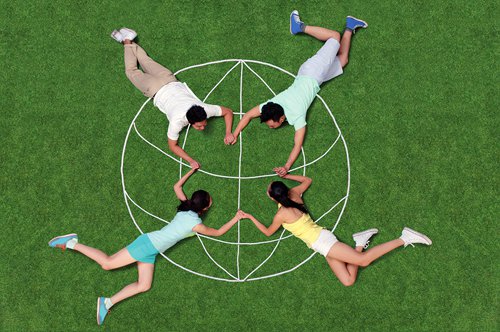
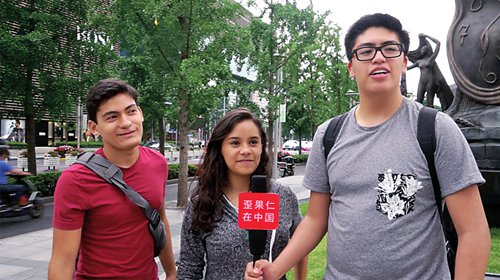
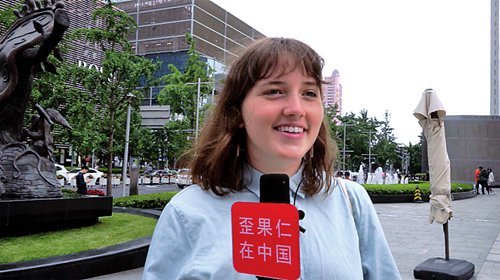
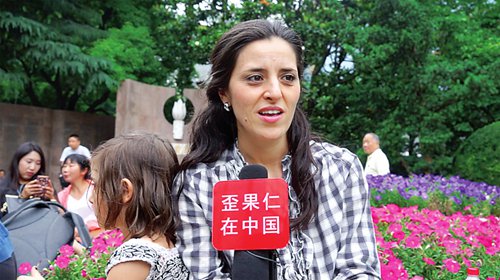
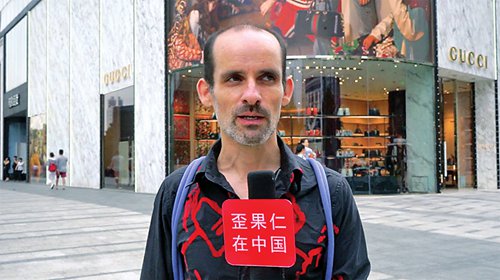

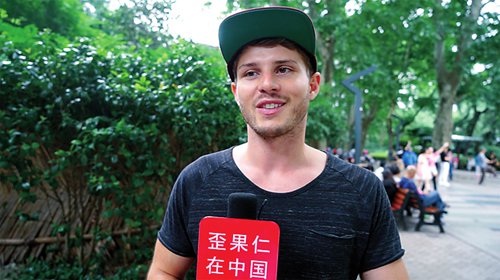
Beat plastic pollution
The Global Times recently hit the streets of Shanghai to ask foreigners to share their opinions on disposable plastic products and environmental protection.
Plastic is of course a part of our daily life, especially plastic tableware, shopping bags and cellophane wrappers around food. Most of our interviewees said that they use and consume disposable plastics quite often, whether they like it or not.
"Coffee cups with a plastic coffee lid almost every day," Monica from Spain told the Global Times. "But I am trying not to use too much plastic in daily life."
"I think I use it more than I would like to," said Carly Freeman from Vermont in the US, adding that she used to see somebody who spent full days or weeks without using any trash or plastic.
"But personally I realize how difficult it is because the world is using plastics to do everything, from cars to water bottles. The world kind of makes it impossible not to use disposable plastics," she said.
Alberto Galan from Spain sticks to his personal "not-use-plastic-product" principle. "I don't use disposable plastics very often and I don't usually buy plastic things," he said. "I don't like plastic."
"But sometimes Galan must go against his own principles, for instance when shopping in grocery stores. "They give me a lot of plastic bags, every vegetable I buy, they give me a bag. But usually I try to put them all together in a single bag," he added.
Solution to pollution
As environmental issues grow more pressing every day, many countries have been working urgently on a solution to plastics pollution. Bangladesh started banning plastic bags in 2002, which makes it the first country to do so, ifeng.com reported in June 2018.
Since 2008, China also started to prohibit producing and selling plastic bags thinner than 0.025 millimeters; local retail markets are no longer allowed to offer free plastic bags. Chinese authorities estimated that 270,000 tons of plastic consumption was reduced within the first year, jiemian.com reported in May 2018.
According to recent information on the official website of China's Ministry of Commerce, the European Commission proposed on May 28 to ban single-use plastic products including cotton buds and plastic straws. They also propose putting a bigger waste-cleaning burden on manufacturers so as to reduce trash in the ocean. The proposal requires European countries to collect 90 percent of single-use plastic drinking bottles by 2025.
Our interviewees shared their opinions on such prohibitions and practices in their home cities. "I think it's a good thing. My school proposed the idea of getting rid of disposable straws. I think it is necessary, because you can just drink directly. I don't think that straws are necessary," Freeman told the Global Times.
Freeman added that, in Vermont, people are required to recycle plastic and cardboard. "If you don't, you will be fined. So I think a lot of people actually do that because they don't want to pay the money, which is a good thing I guess," she added.
"Six or seven years ago, in Spain, they give you plastic bags for free, but now you have to pay," said Albarto Galan from Spain, who said that paying money will remind people to think twice before they consume plastics.
"We should think more about what we produce and consume, because this is a cycle. We produce a lot, waste a lot, but don't recycle, then what happens?" he said.
Banning plastics
Gina Sewell from Chicago in the US said that they have something similar there. "Plastic bags are banned in Chicago, they encourage you to use reusable bags at grocery stores. You have to pay extra [if you want to use plastic bags]. But in a few years, plastic will be completely banned," she said.
Both Sewell and Joseph believe that the bannings will encourage people to use less plastics. "I think maybe more countries should focus on this," Joseph added. "China proposed something similar with wood chopsticks. So I think it is a good way to do this."
Bodrigo Hernandez and Diego Beauregard from Mexico agreed. Beauregard confirmed that, in Mexico, they are trying to implement new techniques to avoid plastic pollution, although "the problem is not solved yet," and people are also running campaigns to promote reusing and recycling plastics.
"I hope that Mexico will employ the same laws," Hernandez told the Global Times.
Monica from Spain said that it is forbidden to give plastic bags for free and she shows support for banning. However, she believes that it is probably better to help companies pack their products in an environment-friendly way.
"In the end, people will seal their food and take them away. You have to give an alternative to the companies, and companies still need to do business," said Monica. "It is probably better to help producers who are promoting a different type of packaging, rather than just banning it, because there is still a need in the market."
Speaking of the anti-environmental behavior, many of our interviewees dislike people throw trash on the ground or in the ocean. Galan said he used to stop anyone he saw who littered and reminded them to take it away. "I hate people who just throw trash like plastic bottles on the ground instead of reusing them or separating them correctly," Hernandez said.
Plastic island
As more and more plastic waste is littered into ocean, a literal plastic island has taken shape in the Pacific Ocean, a big threat to both marine and human life. Freeman is angry about this phenomenon.
"I know that there is a lot of plastic not being disposed of correctly and there is that big island of plastic in the ocean right now, something bigger than an American state. I am very sad that we don't know what to do with all this plastic piling up," she said.
Monica works in the fashion industry. "There is a lot plastics involved in fashion. Everything is polyester which really means plastic. So every time we throw away polyester, it is the same as throwing away plastic. It has the same effects on the environment," she said.
"People like to buy cheap clothes and then throw them away the second day, which is something that pissed me off the most," she added.
Reducing plastic pollution requires involvement from everybody, such as not using drinking straws, recycling plastic bottles and looking for alternatives. Our interviewees shared their tips based on their own daily experiences.
"When you go to a restaurant don't asks for straws. If you are going to drink water, don't buy plastic bottles because those harm the environment a lot," Beauregard suggested.
Joseph suggests that people bring their own cups and reuse when they buy coffee at a cafe, and to bring their own reusable shopping bags to grocery stores. "Everybody is responsible for the environment, they should encourage themselves," he added.
Sewell proposes people not leave water running at home, to use reusable plates and cups and avoid straws. "The government should invest more time, more resources and money in protecting the environment."
The profit goes to them
Monica believes that customers should refuse plastics."For example, when you buy five breads, they will put each of the bread in one plastic bag and then all of them together in one bigger plastic bag. If customers say 'no no, I don't want these many bags,' then eventually the stores will realize that people do not need that many plastic bags," she said.
Monica thinks that if people can refuse plastic on a daily basis, markets will start to understand that customers do not want over-packaging any more.
She also mentioned that governments should restrain big players in the fashion industry from wasting plastic. According to Monica, some large fashion companies do not recycle or reuse plastic hangers packed together with imported clothes.
"The cost goes to the government because the companies throw them into the environment," she said. "Big companies throw away millions of plastic hangers, the cost goes to us but the profit goes to them."
Galan stresses the influence of a good example. "People who care will give an example to other people, then people will change little by little," he said.
He also believes that people should develop a good habit from small things. "We have to educate people inside the house first. You clean your house every day, you will see you are happier inside your home. If you do it in your own home, you can also do it in a public space," he added.
Moreover, Galan proposes that governments make laws that make plastic products more expensive, then people will rethink using plastics. "Plastics come from petroleum, and petroleum is a finite resource. If we don't use plastics, we can save resources and energy for other things."
He also stressed to run more public campaigns to appeal more to ordinary people to care about their planet. "Because the public space is everyone's space," he said.

Photo:VCG

From left: Bodrigo Hernandez and Michelle Orta and Diego Beauregard from Mexico Photos:Chen Xia/GT

Carly Freeman from Vermon of the US Photos:Chen Xia/GT

Monica from Spain Photos:Chen Xia/GT

Alberto Galan from Spain Photos:Chen Xia/GT

Gina Sewell from Chicago of the US Photos:Chen Xia/GT

Joseph from Germany Photos:Chen Xia/GT
